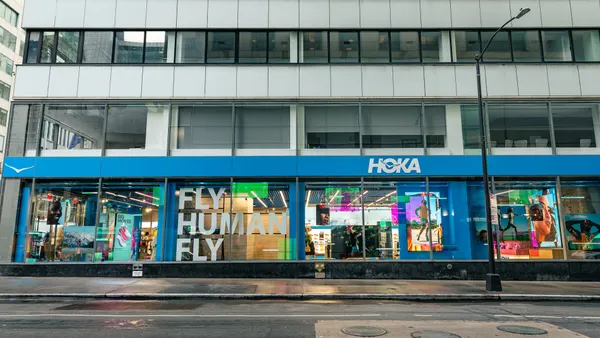Dive Brief:
-
Bed Bath & Beyond announced on Wednesday it will close about 200 stores, mainly from its namesake banner, over the next two years. This represents about 20% of the Bed Bath & Beyond banner.
-
The company expects to generate between $250 million and $350 million in annualized savings from store closures; lower supply chain costs; selling, general and administrative cost optimization; and more efficient pricing and promotions, executives said on a conference call with analysts.
-
This comes as the company reported first quarter net sales fell nearly 50% to $1.3 billion, according to a press release.
Dive Insight:
As with most nonessential retailers, Bed Bath & Beyond was forced to temporarily shutter its stores.
The closures took a hit to the retailer's topline sales and gross margin. The retailer's gross margin fell 780 basis points to 26.7% from 34.5% in the year-ago period, and sales from stores declined 77% in the quarter ended May 30. However, from its digital channels, sales soared 82%, partially aided with the integration of buy online, pickup in-store (BOPIS) services across its banners.
The company in April said it launched curbside pickup at its Harmon stores and introduced BOPIS and curbside pickup to all of its BuyBuyBaby and Bed Bath & Beyond stores in Canada. The company in late May also said it expanded curbside pickup to some 1,350 stores, making the service available to 90% of its fleet in the U.S. and Canada.
CEO Mark Tritton said at the time that customers were "responding well to the launch of BOPIS and contactless curbside pickup, with these services accounting for a meaningful percentage of our Bed Bath & Beyond US digital sales in the last week, and we anticipate continued growth as we expand the service to more stores in the coming weeks."
Now with nearly all of the retailer's stores reopened, sales appear to be ticking back up, though not quite at pre-pandemic levels.
According to data provided by foot traffic analytics firm Placer.ai, weekly visits to stores were down 22% from last year during the week of June 15, an improvement from a few weeks prior when levels were down 72% year over year.
"The business has bounced back very strongly as stores reopen," Wedbush's Seth Basham said in emailed comments. "Indeed, sales declined only -7% in June on a -25% decline in store sales, but comp sales in stores that reopened were down only [low single digits] (and many stores are comping positive)."
Prior to Wednesday's announcement of 200 permanent store closures, Bed Bath & Beyond had already been working to streamline its business by selling off some of its non-core assets, like One Kings Lane and PersonalizationMall.com. Investors have also been pushing for the retailer to go further and unload Cost Plus World Market and Christmas Tree Shop as well.
"With improving operating performance, inventory reduction opportunities remaining, potential asset sales outstanding ... as well as what we estimate to be ~$200m in additional real-estate, we remain comfortable with BBBY's liquidity position," Basham said.
The company also recently laid off hundreds of employees in New Jersey and Florida, and closed a contact operations center in Ocoee, Florida. This came after the retailer announced in February it would cut 500 jobs, or 10% of its workforce, as part of a restructuring plan. Earlier that month, Bed Bath and Beyond laid out a $1 billion capital allocation strategy, which included spending up to $400 million on store remodels, supply chain improvements, and IT and digital projects, in addition to about $600 million on share repurchases and reduction of debt. In response to the coronavirus pandemic, the company suspended its share repurchase, debt reduction and quarterly dividend programs, but CFO Gustavo Arnal said on the call that it "remains committed to a capital return program over the mid- to long-term and we'll reevaluate when appropriate."














